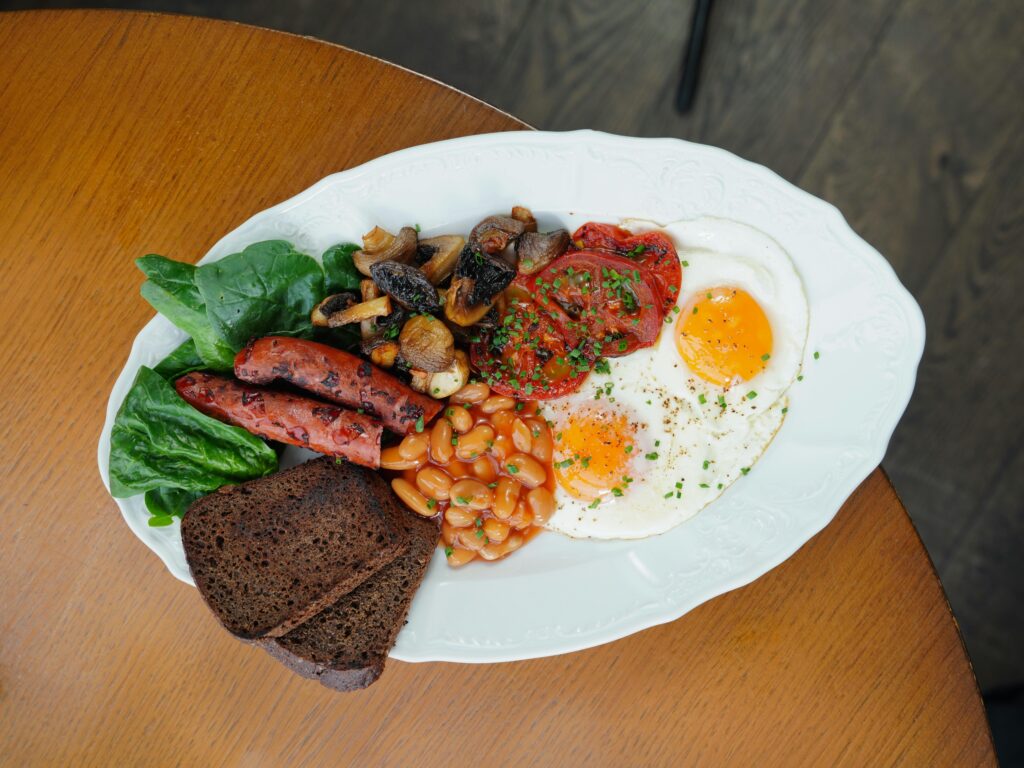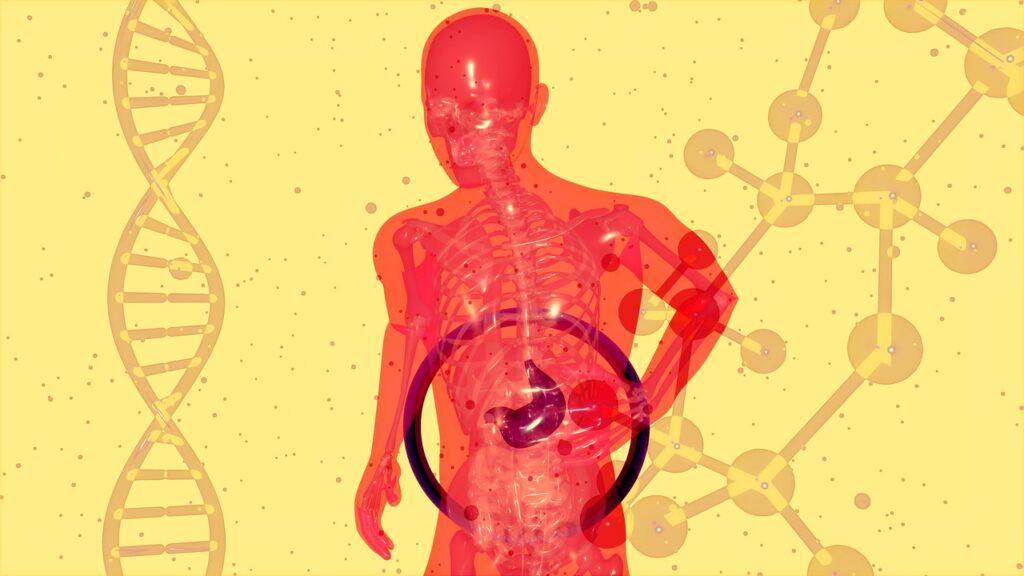
More and more adults in the United States realize that feeling more focused,
invigorated, and less bloated is all dependent on gut health. And you know what? Your
The morning meal is where it all begins. A high-protein, gut-friendly breakfast can influence
how you feel, digest food, and how much energy you have throughout the day.
This guide will show you how to make 18 tasty, high-protein breakfasts that are also the
finest foods for gut health, including ones that are high in fiber, probiotics, and
prebiotics.
Why Gut Health Matters More Than Ever
What Is Gut Health?
Your gut is your second brain, and it does more than just aid with digesting. Trillions of
Bacteria in your gut microbiome affect everything from your immune system to your
metabolism to your ability to think clearly.

Signs You Might Have Poor Gut Health
● Constant bloating or constipation are indicators that your gut health may be
compromised.
● Breakouts of skin
● Insufficient energy or inadequate sleep
● Intolerant foods
How Your Diet affects the Gut
The food you eat supplies nutrients to your gut bacteria. Junk food creates bad bacteria.
Fermented foods, fiber, and probiotics all support the growth of beneficial bacteria.
Why Your Gut Benefits from High-Protein Breakfasts
Protein isn’t just for people who work out. A diet rich in protein is beneficial.
● prolong feelings of fullness (reducing harmful snacking)
● Encourage a healthy metabolism
● prolong feelings of fullness (reducing harmful snacking)
Additionally, eating protein early in the day helps maintain a healthy digestive tract and
balance blood sugar.
A Gut-Friendly Breakfast: What Is It?
Keep an eye out for these attributes:
● Rich in high-quality protein (protein powder, yogurt, tofu, and eggs)
● Carbohydrates high in fiber (whole grains, oats, fruits)
● Nuts, chia seeds, and avocados are excellent sources of fat.
● Greek yogurt, kimchi, bananas, kefir, and other foods that contain probiotics or
prebiotics
18 High-Protein Breakfasts That Boost Gut Health
Yogurt & Smoothie Options
1. Bowl of Greek Yogurt with Chia Seeds and Berries
Probiotics added to Greek yogurt help the gut’s good bacteria grow. Berries and
Chia seeds are rich in fiber, which helps with digestion.
2. Spinach, Banana, and Almond Butter Kefir Smoothie
Kefir is a fermented beverage that contains probiotics to help regulate the gut flora.
Bananas and spinach both contain prebiotic fiber, while probiotics aid with growth.
3. Cottage Cheese Parfait with Flaxseeds and Kiwi
The protein in cottage cheese is low; the omega-3 fatty acids in flaxseeds reduce
inflammation, and the gut lining is healthy.
Egg-Based Gut-Loving Meals
4. Veggie Omelet with Spinach and Mushrooms
Natural prebiotics found in mushrooms help to support intestinal microorganisms.
Antioxidants and spinach fiber are excellent sources of nutrients that aid in
digestion.
5. Kimchi and scrambled eggs on whole grain toast
Kimchi is a fermented food that contains live probiotics, which can help to
improve gut immunity. Fiber from whole grain bread helps with digestion and
improves bowel movements.
6. Avocado Toast with Sauerkraut and Poached Eggs
Healthy fats from avocados help to protect the lining of the stomach.
Probiotic-rich sauerkraut helps to strengthen the gut microbiota.
Oats and Grain Bowls
7. Overnight Oats with Blueberries, Yogurt, and Chia
Because of the soluble fiber in oats, gut bacteria tend to use them as fuel.
Probiotics, prebiotics, and chia yogurt mix make the ideal combination.
8. Quinoa Bowl for Breakfast with Almonds and Apples
Quinoa is a complete protein source that aids with digestion. Pectin fiber from
Apples are very beneficial for gut microbes.
9. Warm Banana and Walnut Protein Oatmeal
Bananas and oatmeal both contain soluble fiber, which helps to calm the
stomach. Omega-3 fatty acids found in walnuts can reduce inflammation in the
intestines.
Pancakes, Wraps, and Toasts
10. Protein Pancakes with Yogurt & Honey Drizzle
These protein pancakes with yogurt and honey drizzle are made with almond
flour, oats, and fiber. Probiotics, yogurt, honey, and natural antioxidants can all
help to promote gut health.
11. Wrap for breakfast with hummus, greens, and eggs
The source of hummus fiber and resistant starch is the intestinal flora that they
support. Digesting and absorbing nutrients from fresh greens is a difficult task.
12. Toast with Almond Butter and Sliced Banana and Chia
Almond butter contains beneficial fats that can help repair the intestinal lining.
Chia seeds and bananas are good sources of prebiotic fiber.
Plant-Based and Vegan Choices
16. Hard-Boiled Eggs with a Probiotic Drink
Eggs are one such thing that provides high protein, and drinks like probiotics
support the gut bacteria. Both are prepared quickly after milking.
17. Protein Bar + Kefir Shot
Low-sugar protein bars are an energy diet, a negligible amount of live probiotics
are there, which support your digestive and immunity systems
18. Oat Muffins with Protein Powder and Blueberries
Baked oats are full of fiber, blueberries are antioxidants, and prebiotics are a diet.
Supplements like protein powder help in muscle repair and gut health.
What to Avoid for Better Gut Health
There are some foods that damage your gut bacteria. You should avoid them or keep
them in limit; this will be best for you. Try to limit:
● Artificial sweeteners (These artificial sweeteners can disturb the balance of
healthy bacteria, or good bacteria, in your gut and can even have a negative effect
on digestion.)
● Highly processed foods (These do not contain neutral fibers and can even
damage the support tube bacteria for the gut.)
● Excess sugar (Eating too much sugar can be harmful for you and increases
your bacteria, which disturbs gut health.)
● Fried/greasy meals (eating such food slows down the digestive process and can
lead to excessive heaviness or bloating in the stomach)
How to Make Your Own High-Protein, Gut-Healthy Breakfast
An easy way to make a gut-friendly breakfast is to follow these four clever steps:
● Protein add karna na whole: Greek yogurt, eggs, tofu, and whey protein are all
good starting points.
● Oats, whole-grain bread, and seasonal fruits are good sources of fiber that aid
with digestion.
● Kefir, kimchi, and sauerkraut are examples of fermented foods that can help your
gut’s beneficial bacteria.
● Natural sweeteners like honey, cinnamon, and stevia are used; refined sugar is
used as a sweetener.
Final Thoughts
If you also want to make your gut health better or stronger, then start your day with a
powerful, high-protein breakfast. When you fuel your body with probiotic-rich and
fiber-filled foods, your digestion, energy, and mood all start feeling better.
One of the best tipss for you is to try a gut-friendly breakfast from tomorrow both your
Your belly and brain will thank you!
FAQs—Best food for gut health
What is the best breakfast for gut health?
A high-protein breakfast like Greek yogurt with berries or chia seeds or these would be
the best options. Because they contain probiotics, fiber, and clean protein. Which is
perfect for digestive health and a healthy gut.
Are eggs good for gut health?
Yes, yes, absolutely! There is one such thing that contains high-quality protein. If you
also eat these with fiber-rich foods (like oats or whole-grain toast) or fermented foods
like kimchi or sauerkraut, then it becomes a super and highly gut-friendly breakfast.
How can I make my breakfast more gut-friendly?
Lean proteins, fiber-rich meals (fruits, oats), and fermented foods (like kimchi or kefir)
should be added.
